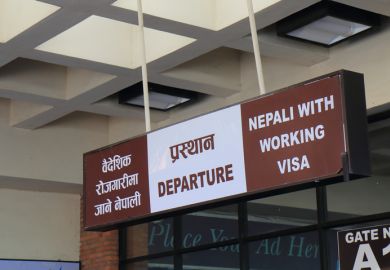Unethical agents and discounts masquerading as scholarships are undermining Australian efforts to meet India’s educational needs and generate a pipeline of quality students from the subcontinent.
A report sketching educational opportunities for Australian institutions in South Asia has found that rampant poaching, facilitated by agents in both regions, is tarnishing the industry’s reputation.
The independent report, commissioned by the Association of Australian Education Representatives in India (AAERI), has also found that South Asian agents are farming out work to subcontractors in contravention of explicit bans by Australian universities.
Meanwhile, universities are shooting themselves in the feet by advertising discounts – designed to undercut local competitors – as “scholarships”.
While this approach is “working as a recruitment tool” it is “devaluing scholarships”, which Indians associate with academic merit. The tactic is cultivating a “race to the bottom” and undermining attempts to recruit Indian doctoral students, who gravitate to the UK and US instead.
“There are examples of ‘scholarships’ being advertised to encourage early applications,” the report says. “Some institutions, universities in particular, are now targeting students who already have a scholarship and offering to match [it].”
The report urges universities to adopt “more appropriate” terms such as discounts, bursaries or living allowances. “The best students from India and South Asia are going to the US and UK, often with full scholarships,” it notes.
“Both countries are also attracting a higher proportion of PhD candidates. If Australia can attract [more] students going on to research programmes, this will assist to gradually position Australia as a high-quality study destination.”
The stakes are high for both countries as Australia confronts the decline of its lucrative intake of Chinese students. While Indian interest in Australia is booming, with more student visa applications lodged in India than China in 2018-19, there are questions over many Indians’ academic capacity and their ability to pay Australia’s lofty tuition fees.
Meanwhile, India desperately needs help to exploit its “human capital advantage”, with the Australian International Education Conference hearing that the “bulge” in India’s working age population will last until 2055.
Lyndall Corbett, acting education counsellor at the Australian High Commission in New Delhi, said Japan, China and South Korea had been able to parlay the “demographic dividend” of their once youthful populations into strong economic growth. But India would struggle to follow suit, as its universities produced “high numbers of graduates who don’t have relevant job skills”.
“Countries can only harness the potential of their youth bulge if they’re able to provide quality education,” she said. “There’s unmet potential in India.”
The new report offers 25 recommendations to help Australia address these challenges over the next five years. It is framed as a response to a 2018 review by Australia’s former head of foreign affairs, Peter Varghese, who highlighted the educational export opportunities in India.
The recommendations include extended work rights for international graduates in Australia, along with five changes to AAERI’s operations. AAERI president Ravi Lochan Singh welcomed the criticism. “It shows how independent the report is,” he said.
Meanwhile, Australia’s education department has released an “overview report” of education agents working with Australia. Last year almost 7,000 agencies worked with Australian education providers, most of them small- or medium-sized. Almost one-quarter had been operating for a year or less.
Register to continue
Why register?
- Registration is free and only takes a moment
- Once registered, you can read 3 articles a month
- Sign up for our newsletter
Subscribe
Or subscribe for unlimited access to:
- Unlimited access to news, views, insights & reviews
- Digital editions
- Digital access to THE’s university and college rankings analysis
Already registered or a current subscriber?








